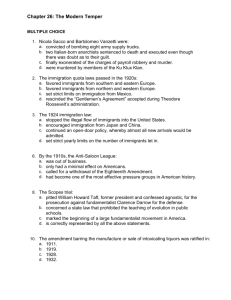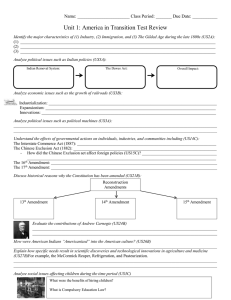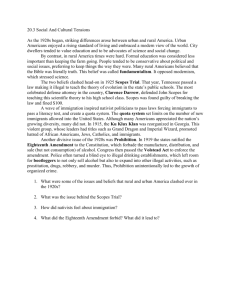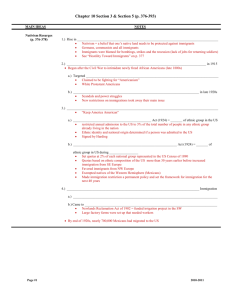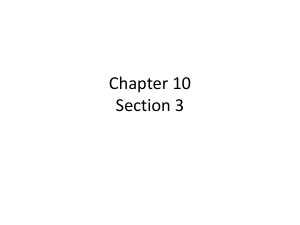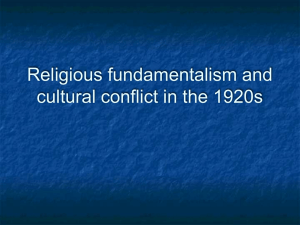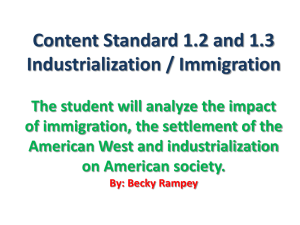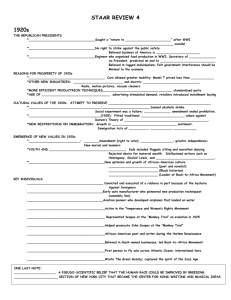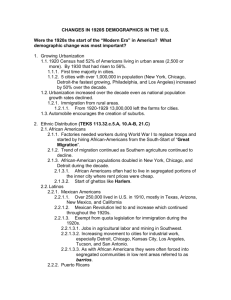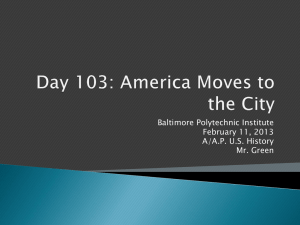Chapter 11 Section 3 Notes
advertisement
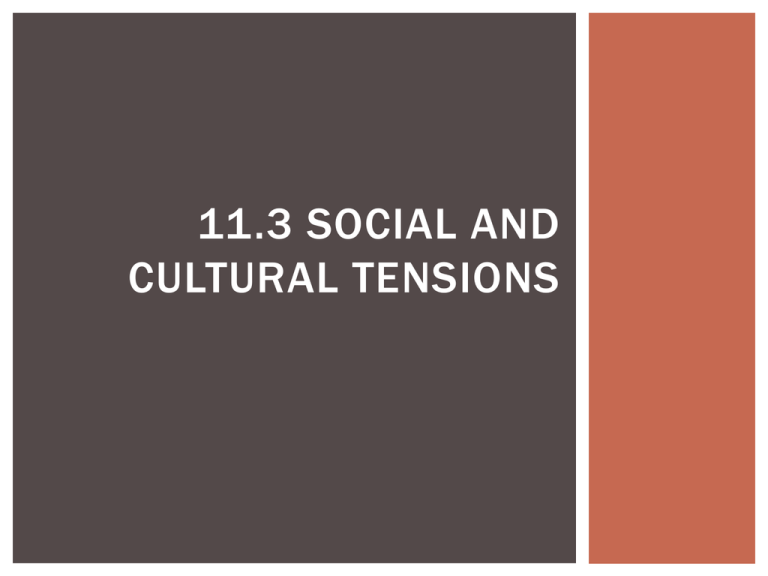
11.3 SOCIAL AND CULTURAL TENSIONS OBJECTIVES Compare economic and cultural life in rural America to that in urban America Discuss the changes in U.S. immigration policy in the 1920s Analyze the goals and motives of the KKK in the 1920s Discuss the successes and failures of the 18 th amendment FIRST TIME FOR EVERY THING 1920 census-more people lived in urban areas than in rural regions Split between urban and rural America Education becomes more important Ingredient for success Modernism Growing trend to emphasis science over secular values over traditional ideas about religion Fundamentalism Emphasized Protestant teachings and the belief that every word in the Bible was literal truth SCOPES TRIAL 1925 Fundamentalism and Modernism clash head-on John Scopes-Tennessee teacher who wanted to teach evolution to his science class Clarence Darrow -most celebrated defense attorney Scopes found guilty of breaking the law -fact that was never in question Fined $100 Each side still believed in the truth of its position THE BATTLE OVER EVOLUTION O P P O N E N T S O F D A R W I N ’ S T H E O R I E S S E T U P S H O P AT T H E O P E N I N G O F T H E FA M E D “ M O N K E Y T R I A L ” I N D AY T O N , T E N N E S S E E , I N 1 9 2 5 . T H E T R I A L W A S A N E A R LY B AT T L E I N A N A M E R I C A N “ C U LT U R E W A R ” T H AT I S S T I L L B E I N G W A G E D M O R E T H A N S E V E N T Y- F I V E Y E A R S L A T E R . RESTRICTING IMMIGRATION Congress passed a law requiring immigrants to take a literacy test before WWI began Immigrants who could not read or write their own language were prohibited Emergency Quota Act 1921 Put quota on immigration from specific countries National Origins Act # of immigrants of a given nationality could not exceed 2% of the # living in the U.S. in 1890 Excluded most Asian immigrants THE ONLY WAY TO HANDLE IT I S O L AT I O N I S T S A N D N AT I V I S T S S U C C E E D E D I N D A M M I N G U P T H E F L O W O F I M M I G R A N T S T O T H E U N I T E D S TAT E S I N T H E E A R LY 1 9 2 0 S . T H E I M M I G R AT I O N A C T O F 1 9 2 4 P L A C E D S T R I C T Q U O TA S O N E U R O P E A N I M M I G R A N T S A N D C O M P L E T E LY S H U T O U T T H E J A PA N E S E . ANNUAL IMMIGRATION AND THE QUOTA LAWS MEXICAN IMMIGRANTS Quota system did not apply to Mexico Settled in sparsely populated regions of the Southwest and contributed to economies Found work harvesting crops ion TX and CA Smaller number worked factories and farms in North and Midwest KKK-KU KLUX KLAN Targeted African Americans, Catholics, Immigrants, Jews, and suspected radicals Revived in 1915 from original KKK after Civil War to terrorize African Americans who sought to vote Burned crosses, boycotted businesses, and terrorized citizens in the darkness of night Wore masks, waved flags, preached hate and followed leaders-Grand Dragon and Imperial Wizard KLANSWOMEN ON PARADE, 1928 FOUNDED IN THE RECONSTRUCTION ERA, THE KU KLUX KLAN ENJOYED A REMARKABLE RESURGENCE IN THE 1920S. HERE WOMEN MEMBERS, UNMASKED AND UNAPOLOGETIC, MARCH DOWN P E N N S Y LVA N I A AV E N U E U N D E R T H E S H A D O W O F T H E C A P I T O L DOME. ANTI-KKK NAACP and the Jewish Anti-Defamation League Embraced idea of racial, ethnic, religious, and cultural diversity Focused on positive aspect of “melting pot” Eventually, KKL never disappeared, but lost importance PROHIBITION 18 th amendment– prohibited the manufacture, sale and transportation of alcoholic beverages on the U.S. Volstead Act-officially enforced the amendment Supporters “drys” argued that alcohol was the root of many problems Speakeasies-clubs or bars where liquor was sold illegally bootlegging-illegal sale or distribution of alcohol NO MORE MOONSHINE F E D E R A L A G E N T S G L O AT O V E R A C A P T U R E D S T I L L I N D AY T O N , O H I O , I N 1930. “MOONSHINERS,” OR MAKERS OF ILLEGAL LIQUOR, ENJOYED A BOOM DURING PROHIBITION, THOUGH ZEALOUS G -MEN (GOVERNMENT AGENTS) PUT THE OWNER OF THIS MAKESHIFT DISTILLERY OUT OF B U S I N E S S — AT L E A S T T E M P O R A R I LY. GANGSTER AL CAPONE FISHING IN FLORIDA CAPONE MAY HAVE LOOKED LIKE ANY CHICAGO BUSINESSMAN ON VACATION, BUT HIS BUSINESS WAS BIGGER AND NASTIER THAN MOST, AS HE OFTEN ELIMINATE D HIS COMPETITION BY MURDER. HE WAS REPORTED AS SAYING, “EVERYBODY CAL LS ME A RACKETEER. I CALL MYSELF A BUSINESSMAN. W HEN I SELL LIQUOR, IT’S BOOTLEGGING. WHEN MY PATRONS SERVE IT ON A SILVER TRAY ON LAKE SHORE DRIVE, I T’S HOSPITALITY.” HE WAS FINALLY JAILED IN 1932 FOR FALSIFYING HIS INCOME TAX RETU RNS. CRIME Al Capone- Gangster who controlled Chicago with his small army of mobsters Sold alcohol Carried out violence against rival gangs Elliot Ness- Led group called the Untouchables Carried out raids against bootlegging Responsible for the conviction and arrest of Al Capone 21 ST AMENDMENT Repealed the 18 th amendment Selling, manufacturing, and consuming of alcohol legal again
